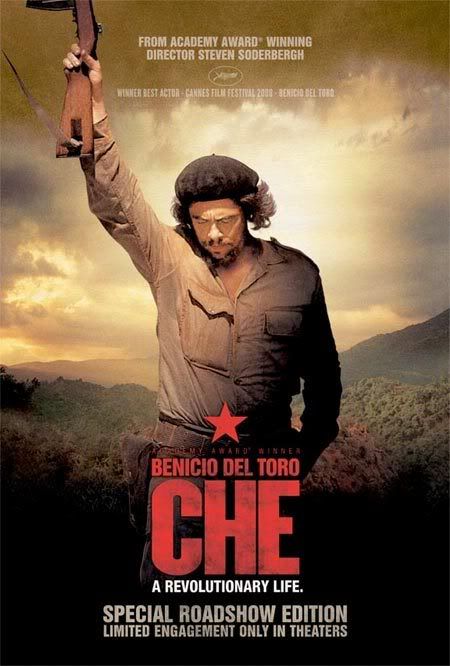
The roadshow version of Che finally arrived in Montreal, and to be sure, four and a half hours in a movie theater (including intermission) is a test for any moviegoer. But when it’s a dense, Spanish language film about revolutionary politics and guerilla warfare, the film demands a certain dedication. But not only does director Steven Soderbergh reward the audience for sticking with him through his riveting film, he has created one of the most intriguing portraits of a political figure in recent memory.
Part One of the film covers the intial meeting of Guevara and Fidel Castro, the roots of the Cuban revolution and the gradual taking of the entire country. Spliced into the story, is a narrative covering Guevara’s interview by CBS reporter Lisa Howard, his 1964 visit to New York City and speech to the United Nations. At first, the connection between the stories isn’t quite apparent, but what emerges is a study of contrasts. Soderbergh’s film instead of being a straight biography of Che Guevara, uses the figure to investigate where ideological and political warfare intersect and separate. As we watch Guevara gradually construct an army built from peasants, introduce reading and writing in makeshift camps and bring medical care to those who’ve never had it, we are blunted by this same man in military fatigues in swanky Manhattan apartments being asked for autographs and having his photo taken. And as Guevara speaks to the UN, it becomes apparent that the direct actions that are perhaps required in a third world nation, are not easily rationalized to an audience of first world politicians where warfare is conducted in meetings and handshakes.
While Castro transitioned easily from revolutionary to politician, Guevara’s ideals still drove him, and Part Two finds him in the jungles of Bolivia bringing the ideals forged in Cuba to a new struggle for independence. But more than a decade has passed, and the United States in the thick of Vietnam and an emerging Cold War have become more active in quashing unfriendly movements and anything perceived as being communist. The Bolivian government’s response to rumors of Guevara organizing in the countryside isn’t an ideological affront, but rather politically calculating. They engage US intelligence, spread propaganda and initially deny the presence of Guevara at all. Meanwhile, Guevara sticks to his methods used earlier in Cuba but finds loyalty harder to earn, discipline lacking, peasants more fearful and stigmatization because of his foreign status.
What emerges is a complex portrait of a man that Soderbergh bravely decides not to pass judgment on in either direction. Guevara is neither idolized nor pilloried, instead it’s only the results of his actions that are depicted. We see a man committed to educating his people and creating a society based on communal resources and values. However, we also see a man who at times is so stubbornly committed to his political vision, that he is blinded to their consequences which are more often than not, tragic.
Many have criticized Che for skipping over key parts of Guevara’s life or not being more critical about the blood on his hands, however, Soderbergh is wise in not trying to summarize a life that has become mythic in stature. Che is an ideological sketch of a man who struggled between his political, guerilla and humanitarian beliefs right up until his death.



No comments:
Post a Comment